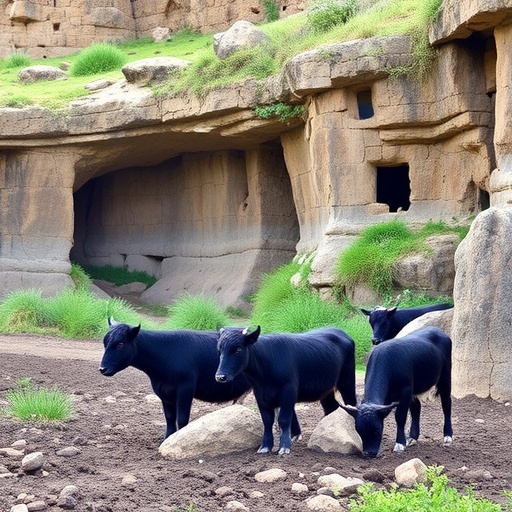In the quest to sustain global agriculture and mitigate climate change, scientists are increasingly turning their attention to innovative soil amendments that can enhance carbon sequestration, especially in fragile ecosystems. A groundbreaking study recently published in Carbon Research reveals how biochar, a carbon-rich product derived from organic waste, dramatically improves soil organic carbon fractions in karst grasslands. This discovery offers promising new avenues for managing grazing lands, which are vulnerable to soil degradation and carbon loss.
Karst landscapes, characterized by their soluble rock formations and thin soils, present unique challenges for maintaining soil health and fertility. Grazing animals in these regions often exacerbate soil disturbance through trampling and nutrient disruption, accelerating carbon emissions and undermining the land’s long-term productivity. The urgent need to retain soil carbon—to keep it out of the atmosphere and underground—has propelled researchers to explore biochar as a potentially transformative soil amendment.
Biochar functions much like a probiotic for soils. Produced by pyrolyzing biomass waste, it generates a stable form of carbon capable of persisting in soils for decades or even centuries. This property not only locks carbon away but also fosters a thriving soil microbiome that enhances nutrient cycling and soil structure. The recent study sheds light on just how powerful biochar can be in this regard.
The experimental research deployed simulated grazing conditions using tall fescue grass across two distinct parent soil types common in karst regions: iron-rich red soils and calcium-rich calcareous soils. These contrasting soils offer a natural laboratory to assess how biochar interacts with different soil chemistries to affect soil organic carbon (SOC) dynamics. The lab results were nothing short of remarkable.
Application of biochar increased total soil organic carbon by an astonishing 595%, a magnitude of effect that few soil amendments can match. Beyond that, it elevated mineral-associated organic carbon (MAOC) by 39%, which is significant because MAOC represents the most stable and long-lasting form of carbon in soils. Intriguingly, these benefits were observed across both red and calcareous soil types, demonstrating biochar’s universal potential to enhance carbon storage mechanisms.
Central to biochar’s efficacy is its role in stimulating the soil microbial community. The porous, nutrient-rich matrix of biochar provides a benign habitat for microbes, which in turn expedite the breakdown of organic matter and promote formation of persistent carbon-mineral complexes. These complexes involve metals such as iron, aluminum, and calcium, which chemically stabilize carbon compounds. Biochar effectively turbocharges this natural carbon capture system.
The efficacy of biochar, however, is strongly mediated by the parent soil type. The alkaline properties of biochar are particularly advantageous in acidic red soils, where they help mitigate acidification and synergize with iron to secure carbon more effectively. Conversely, in calcareous soils that are naturally alkaline and calcium-rich, biochar’s benefits materialize more gradually. Notably, simulated grazing reduced SOC in calcareous soils, but crucially, biochar application buffered this loss, underscoring its protective capacity.
This soil-specific performance highlights the necessity for precision land management strategies in karst regions. Generic one-size-fits-all solutions are unlikely to achieve optimal results. Tailoring biochar application based on soil chemistry can maximize carbon sequestration while simultaneously enhancing soil resilience to grazing and environmental stressors.
The study’s implications extend far beyond the laboratory. Karst landscapes, with their propensity for erosion and fragile soil profiles, are hotspots of ecological vulnerability. Implementing biochar as part of integrated land management protocols offers a viable, scalable pathway to strengthen these ecosystems. By preserving soil carbon stocks, farmers can maintain productivity and contribute to global climate mitigation goals.
Such research underscores biochar’s promise as a potent tool in the agroecological toolkit. Dr. Daniel Petticord from the research team emphasizes that while biochar is not a silver bullet, its strategic application aligned with the right soil types can yield transformative benefits. Co-author Dr. Xuxin Song remarks on the significance for millions in China’s karst regions who rely on these fragile ecosystems for sustenance and economic activity.
Looking forward, it is clear that long-term studies and field trials will be essential to fully elucidate the dynamics of biochar in variable environmental contexts. Understanding how biochar influences soil microbial ecology, nutrient cycling, and plant growth over multiple seasons will refine application guidelines and optimize its role in sustainable pasture management.
This research signals a pivotal shift in how we approach soil stewardship in vulnerable landscapes. By harnessing biochar’s ability to amplify natural carbon stabilization mechanisms, we can move closer to a regenerative paradigm—one that not only combats climate change but also enhances soil fertility and ecosystem health.
As global attention intensifies on carbon capture and sustainable agriculture, these findings spotlight the dynamic interplay between soil chemistry, microbial biota, and innovative amendments. Biochar’s emergence as a keystone technology affirms the critical importance of integrating multidisciplinary science to solve complex environmental challenges.
Thanks to the collaborative efforts between scientists at Cornell University and Guilin University of Technology, this study offers a cutting-edge blueprint for reviving karst grasslands. With continued innovation and adaptive management, biochar could usher in a new era of resilient, carbon-rich soils supporting food security and environmental sustainability worldwide.
Subject of Research: Not applicable
Article Title: Biochar efficacy in enhancing soil carbon fractions is mediated by parent soil type in grazing karst grassland
News Publication Date: 7-Jul-2025
Web References: http://dx.doi.org/10.1007/s44246-025-00222-8
References: Zhu, S., Guo, Y., Zhou, H. et al. Biochar efficacy in enhancing soil carbon fractions is mediated by parent soil type in grazing karst grassland. Carbon Res. 4, 52 (2025).
Image Credits: Shiwen Zhu, Yili Guo, Hanhan Zhou, Wenjia Luo, Xun Yi, Yangming Zhou, Yuanlong Wu, Daniel F. Petticord & Xuxin Song
Keywords: Biochar; Calcareous soil; Mineral–associated organic carbon; Red soil; Simulated grazing




